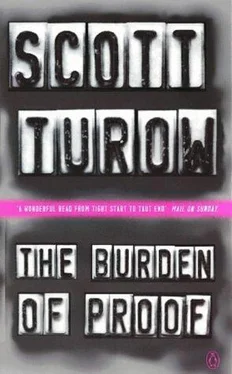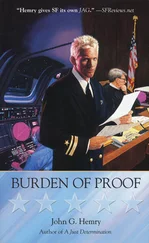Scott Turow - The Burden of Proof
Здесь есть возможность читать онлайн «Scott Turow - The Burden of Proof» весь текст электронной книги совершенно бесплатно (целиком полную версию без сокращений). В некоторых случаях можно слушать аудио, скачать через торрент в формате fb2 и присутствует краткое содержание. Жанр: Детектив, на английском языке. Описание произведения, (предисловие) а так же отзывы посетителей доступны на портале библиотеки ЛибКат.
- Название:The Burden of Proof
- Автор:
- Жанр:
- Год:неизвестен
- ISBN:нет данных
- Рейтинг книги:3 / 5. Голосов: 1
-
Избранное:Добавить в избранное
- Отзывы:
-
Ваша оценка:
- 60
- 1
- 2
- 3
- 4
- 5
The Burden of Proof: краткое содержание, описание и аннотация
Предлагаем к чтению аннотацию, описание, краткое содержание или предисловие (зависит от того, что написал сам автор книги «The Burden of Proof»). Если вы не нашли необходимую информацию о книге — напишите в комментариях, мы постараемся отыскать её.
The Burden of Proof — читать онлайн бесплатно полную книгу (весь текст) целиком
Ниже представлен текст книги, разбитый по страницам. Система сохранения места последней прочитанной страницы, позволяет с удобством читать онлайн бесплатно книгу «The Burden of Proof», без необходимости каждый раз заново искать на чём Вы остановились. Поставьте закладку, и сможете в любой момент перейти на страницу, на которой закончили чтение.
Интервал:
Закладка:
A sufficient time passed to suit all proprieties, he bade John good night and, ready to be on his way, found Kate in the kitchen. Seeing her, though, it occurred to him once more how vexed his last exchange with her had left him. If the bill from Westlab was not for Kate, then what? He was back to point zero.
"Katy," he said, releasing her from his parting embrace, "are you quite sure there was no bill for you that might have come to your mother?"
"Daddy, there is no way. What's wrong with you?" She looked at him, incredulous, and he shrugged, somewhat defensively.
It had seemed so obvious, so characteristic of Clara that the children were involved.
With the next thought, Stern, halfway across the kitchen, stood absolutely still.
He knew now.
He had blundered past it. But he knew now why Clara had received no doctor's bill; why Peter had been so orerwrought that day about the prospect of an autopsy.
Because it was he, Stern's son, who was the physician, Peter who had ordered the lab test, and Peter who remained, even now, resolved to honor some prior commitment of confidence he had made to his mother.
Stern understood the need to maintain professional secrets, but he could not help suspecting that his son would enjoy this advantage over his father, having exclusive hold, in the end, of one last scrap of her life. Might the others know as well?
"Katy." She was facing him, her attention evidently drawn by her father's abstracted look. "Do you know anything of your mother receiving medical care from Peter?"
"What?" Her mouth had fallen open a bit and her face was rigid with alarm. She obviously took the suggestion as baroque. The question that rose in her eyes was easily discemed: Was her father derailed, off his trolley, losing hold? She looked gravely concerned that these ideas, wildand improbable, were coming from him, one after another.
Was he wrong? The kitchen light seemed suddenly intense.
For the first time in his life, he felt a sensation of dislocation, which he knes way, found Kate in the kitchen. Seeing her, though, it occurred to him once more how vexed his last exchange with her had left him. If the bill from Westlab was not for Kate, then what? He was back to point zero.
"Katy," he said, releasing her from his parting embrace, "are you quite sure there was no bill for you that might have come to your mother?"
"Daddy, there is no way. What's wrong with you?" She looked at him, incredulous, and he shrugged, somewhat defensively.
It had seemed so obvious, so characteristic of Clara that the children were involved.
With the next thought, Stern, halfway across the kitchen, stood absolutely still.
He knew now.
He had blundered past it. But he knew now why Clara had received no doctor's bill; why Peter had been so orerwrought that day about the prospect of an autopsy.
Because it was he, Stern's son, who was the physician, Peter who had ordered the lab test, and Peter who remained, even now, resolved to honor some prior commitment of confidence he had made to his mother.
Stern understood the need to maintain professional secrets, but he could not help suspecting that his son would enjoy this advantage over his father, having exclusive hold, in the end, of one last scrap of her life. Might the others know as well?
"Katy." She was facing him, her attention evidently drawn by her father's abstracted look. "Do you know anything of your mother receiving medical care from Peter?"
"What?" Her mouth had fallen open a bit and her face was rigid with alarm. She obviously took the suggestion as baroque. The question that rose in her eyes was easily discemed: Was her father derailed, off his trolley, losing hold? She looked gravely concerned that these ideas, wildand improbable, were coming from him, one after another.
Was he wrong? The kitchen light seemed suddenly intense.
For the first time in his life, he felt a sensation of dislocation, which he knew, instinctively, was typical of the elderly. Kate was correct. Given over to his preoccupations, he had lost his bearings.
What had happened to his lifelong habits of caution, tact, discretion?
He could not simply mn with this knuckleheaded notion and confront his son. If Peter was wrongly accused by his father of even the most wellzintenfioned manipulations, his predictable response would be outrage; the reverberations would shake what little family structure remained. He would have to hunt down Nate Cawley once again and ask him to make inquiries at the lab. That was the best and most discreet alternative.
"An idle thought," he said to Kate. "Allow it to pass." He took his daughter's hand and kissed her on the temple. He thanked her for dinner and waved off her inquiries about whether he was all right. But he found himself increasingly irritated as he walked into the mild night.
Driving along the highway in his Cadillac-this was his car, a Sedan de Ville;
Clara's had been towed away by the dealer in part of that procession of changing scenes and backdrops at the time of her death which he recalled now like a cinema montage-he felt the same rise of difficult emotion.
He was tiring of Clara's gruesome surprises, her hidden world, with enormous sums expended and secret illnesses. In his confusion, he had now even begun to suspect his children. This was her fault, Stern thought suddenly, her fault! The declaration almost rang in him.
Still in this mood, he stopped near home at a convenience store. Certain household tasks remained beyond him. Claudia called in his grocery list from the office and the store obligingly delivered the bags to the back door. But there were always items missing: cream cheese, milk. He never had enough orange juice. Waiting in line, he observed with admiration two young black women who were ahead of him, in halter tops despite the chill of spring, talking high-speed bebop slang, disarmingly casual With their obvious sexuality. He felt again the high-voltage transmissions of sensual energy. What was all this? he wondered. Signs of life, he told himself; natural, he thought, but there was something wild and unpredictable in this urgency. He was so deeply stimulated by virtually any female. Was it some racist conceit to think that he would be as strange as some Martian to these women? He imagined, nonetheless.
What really was the look and feel of those heavy brown breasts, smooth-skinned, heavy-nippled? His imagination rushed on to these thoughts. He stood unmoving in the store, his mouth slightly agape, aroused.
Back in the parking lot, he sat in the car, a bit shocked at himself.
How could he really? You would think, observing his adolescent eagerness, that he'd had no passionate life with Clara, which was not true. As a young man he had craved her more, in fact, after they were married than before, when so much else seemed to be involvedi and even as age and time had tempered the pulse of things, that hunger had never been wholly lost. A man and a woman in the end were always that to each other, opposites and mysterious, and in the act, with its joining and exploring, things more magical and solemn than the most ancient ritual forever resided. Certain other couples, his age and older, made allusions to the extinction of these impulses. Dick Harrison, a neighbor, remarked to Stern one night, 'I hold it up, the sunlight passes through." But three or four times a month Clara and he struck this fundamental compact-creaky, lumpy old bodies as she said, moving toward each other across the bed and, as ten thousand times before, melting together. Lately, he had tried to recall the last occasion and found, almost certainly, that it had been more than a month 'before her death. One more sign of what he should have noticed. But he was on trial, fraught and distracted, and who after the years does not know better than to foment small crises? They move apart and then rejoin.
Читать дальшеИнтервал:
Закладка:
Похожие книги на «The Burden of Proof»
Представляем Вашему вниманию похожие книги на «The Burden of Proof» списком для выбора. Мы отобрали схожую по названию и смыслу литературу в надежде предоставить читателям больше вариантов отыскать новые, интересные, ещё непрочитанные произведения.
Обсуждение, отзывы о книге «The Burden of Proof» и просто собственные мнения читателей. Оставьте ваши комментарии, напишите, что Вы думаете о произведении, его смысле или главных героях. Укажите что конкретно понравилось, а что нет, и почему Вы так считаете.












